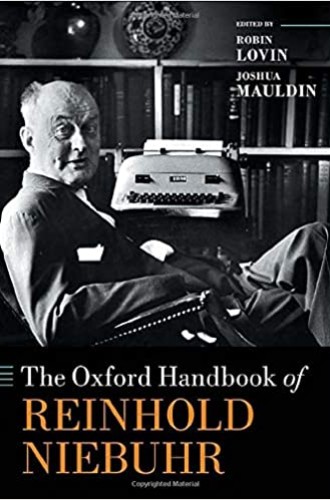The world through Niebuhr’s eyes
38 scholars weigh in on Reinhold Niebuhr’s life and times, his allies and adversaries, his theology and ethics
Reinhold Niebuhr’s Moral Man and Immoral Society was on the reading list of my Introduction to Ethics course in college. Its premise is that individuals are capable of moral behavior, but group behavior tends toward selfishness. Niebuhr’s acknowledgment of moral ambiguity in so much of politics and international affairs has been with me ever since. He helped me to begin to set my own moral compass.
The Oxford Handbook of Reinhold Niebuhr is a timely means of looking at the current world from Niebuhr’s perspective. Edited by Robin Lovin and Joshua Mauldin, it covers his life and times, his allies and adversaries, his theology and ethics and how they affected his politics and his legacy. It also reminds us of the importance of public intellectuals with grounding in theology and ethics in the 20th century. It does so by assembling some of today’s foremost academics to write about Niebuhr. The 38 contributors—academic theologians and ethicists, historians, foreign policy experts, and legal scholars—indicate the breadth of Niebuhr’s influence.
Read our latest issue or browse back issues.
For many years Niebuhr was associated with this magazine. He first wrote for the Century in 1922, and he was a frequent contributor until a rift began with an article he wrote in 1939. In it he argued that the United States should not refuse to be part of the world on the brink of war, while many at the magazine were arguing for a more pacifist course. This book puts that argument in the context of the life and times within which Niebuhr lived, including the intellectual and political movements that were swirling around him, “forging his theological ideas through the pressure of world events.”
Lovin and Mauldin’s goal is to set Niebuhr in his own context and consider the relevance of his thought for today. While they have not entirely succeeded, they have looked at new areas of inquiry such as environmental justice and feminism—areas Niebuhr never touched directly in his writings. More importantly, the book gives readers the tools to consider how Niebuhr’s thinking might be applied to the issues of today.
Why is this necessary when there already exists a considerable bibliography of Niebuhr scholarship, biography, and analysis? Political historian John Bew suggests that a revival of interest in Niebuhr happens in “moments of political trauma, national reckoning, or self-doubt.” Ethicist Eric Gregory suggests that it is “a revival of authoritarian nationalism that sponsors repeated calls for ‘another Niebuhr’ in the public square.” Whatever the reason, a wide range of American politicians, from neoconservatives to Barack Obama, cite Niebuhr and his Christian realism as a key influence on their own thought, and this has increased recent interest in his work.
Much of Niebuhr’s thinking centers on the love ethic that keeps us striving for the good, tempered by sin defined as selfishness. Niebuhr patterns and premises his notion of love on God’s forgiveness, which humbles us and makes us willing to forgive others. However, as theologian Jeremy Sabella writes, our imperfection means that we can only “nudge a broken world incrementally in the direction of justice.” While the ideals of God and Christ “are impossible to realize fully in history as we know it, Niebuhr saw them as standards against which humanity should constantly measure itself,” explains philosopher Kevin Carnahan. Throughout his writings, Niebuhr is clear that humility should temper all our thoughts and actions.
During his life and still today, Niebuhr has been criticized for his theology-lite or biblical-lite ethics and accused of using God as a convenient foil on which to hang his theories. Such criticisms are unsurprising from academic theologians. Niebuhr thrived as a translator of Christian insights for a broader public, writing about good and evil in a way that believers and nonbelievers alike could understand, adapting the degree of reliance on Christ in his narrative largely as a function of the audience he was seeking to reach. This was an eminently pragmatic approach for someone who recognized that society was going to have to find a way to develop a consistent set of moral beliefs in a world of many faiths and none. Stanley Hauerwas characterizes Niebuhr’s work as sermonic essays from a man who did not need to give an account of the church in his work because, as a preacher, he was the church. This need to shape a society through dialogue among people of differing beliefs is yet another reason to call for “a new Niebuhr” today.
Niebuhr developed his ideas not only in his writing but also in his conversations and correspondence with others, his public speaking, and his preaching. He was a bit of a borrower who used the snippets of others and his discovery and rejection of the gospels of others, most notably the Social Gospel and Marxism, to develop his own thinking. Niebuhr often used the dialectical method to think through issues. This book permits readers to better understand how he became the foremost public theologian of his day.
The power of expansive ideas, worked and reworked in decades of sermons, speeches, and articles, evolved into a fully formed theology for Niebuhr’s world. How can we translate that into a theology for the world of today? Some of his aphorisms are perfect for our age with its social media sound bites, from the Serenity Prayer to “Man’s capacity for justice makes democracy possible, but man’s inclination to injustice makes democracy necessary” (from The Children of Light and the Children of Darkness).
And yet, one of the harshest criticisms in this book is in Elizabeth Hinson-Hasty’s chapter on feminism, which states: “Niebuhr’s thought assumes white male US upper middle-class experience as a universal description of the human condition.” If so, then why does his writing resonate so deeply and widely? Niebuhr spent much of his life thinking about power and calling for humility. These are lenses through which the reader becomes able to consider how to apply his ideas to the concerns of any race, class, or gender that feels disadvantaged, even though he did not.
Niebuhr understood that while moral purity may be comforting, it doesn’t necessarily bring about the desired change. The different kinds of sin we experience while trying to achieve love and justice may just be a way of working out God’s purpose for us. As K. Healan Gaston says, studying Niebuhr will continue “to engage those who care about religion, politics, and the quest for earthly justice.” This book serves as a terrific springboard for such study.
A version of this article appears in the print edition under the title “The world through Niebuhr’s eyes.”






